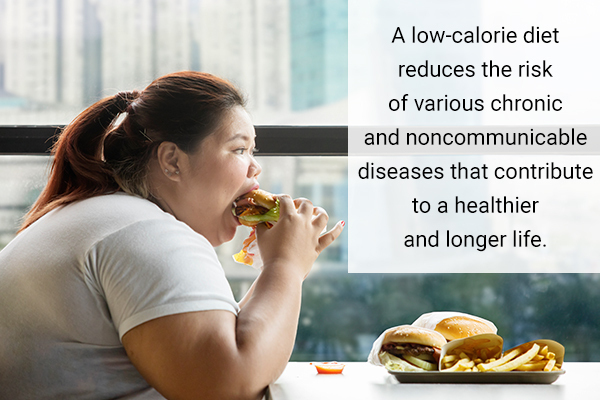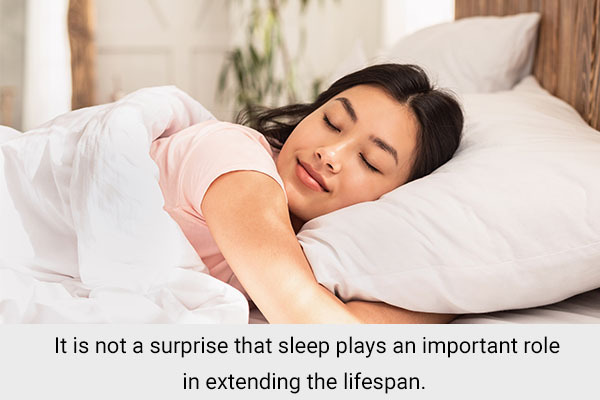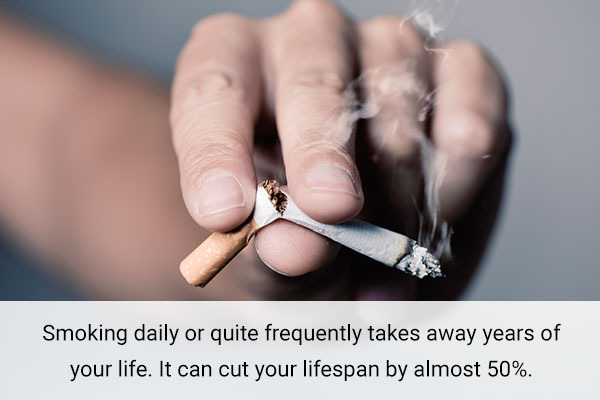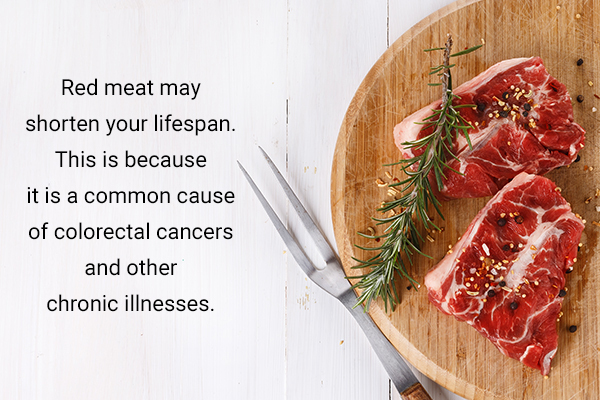In this article:
There have been continuous developments in the field of medical sciences and remarkable growth in the healthcare sector due to technical integrations and digitalization. These factors have contributed to increasing life expectancy almost all around the world.

It is very strongly believed by everyone that your genes dictate how long you live or at least contribute the majority of it, but the truth is your maximum age is not controlled by your genes solely. (1)
Luckily, you get to have a say in raising your life expectancy through timely interventions and lifestyle modifications.
How to Live Longer
If you want to live a longer life, you will have to follow a list of dos and don’ts that impact longevity and overall health.
To live long, you have to give your best and be a better version of yourself. This requires determination, patience, and a lot of positive changes.
Here are some things you should immediately stop doing to live longer.
1. Refrain from overeating

A lot of research and studies, especially on animal models, discovered a link between what you eat, how much you eat, and your life expectancy.
Your calorie intake affects longevity. Studies show that a 20%–50% reduction in daily calorie consumption can increase lifespan.
Similar studies on humans suggest that a low-calorie diet reduces the risk of various chronic and noncommunicable diseases that contribute to a healthier and longer life. (2)
It is also a known fact that these factors contribute to a shorter lifespan:
- Higher BMI than recommended
- Excess body fat
- Unhealthy weight
So, managing your food intake by avoiding overeating or unnecessary snacking is a sustainable way of positively influencing your lifespan.
An increased restriction on food and calorie intake, on the other hand, has the following side effects: (2)
- Low libido
- Increased hunger
- Sensitivity to cold
- Changes in the menstrual cycle
- Fatigue
The best option is to form a nutrition plan personalized to your needs and requirements to surpass any such negative effects.
2. Don’t put a pause on physical activity
Although better medical and healthcare resources are available nowadays, poor lifestyle and daily habits can neutralize any positive impact these may have.
With busier lives and increasing desk jobs, everyone, from students to adults, suffers from lethargy and early-onset musculoskeletal issues due to physical inactivity. Many people are unable to take out even 10 minutes of exercise, which is absolutely essential for a healthier and longer life.
Physical activity is one of the main pillars of longevity. Without physical activity, you cannot realize your dream of living longer and healthier.
It is recommended to do half an hour of exercise, at least 5 times a week, to extend your lifespan. (3) This is applicable not only to medically fit individuals but also to those who suffer from heart diseases, obesity, and other chronic issues.
The most common form of exercise preferred by the masses is brisk walking. You can do it on your way to work or in the evening with a friend. It is considered a moderate-intensity workout that adds extra years to your maximum age. (4)
3. Stop skipping your sleep

It is not a surprise that sleep plays an important role in extending the lifespan. Researchers have found that sleeping for too little (less than 6 hours every day) or a lot (more than 9 hours every day) increases the risk of diseases and negatively impacts health. (5)(6)
A good night’s sleep ensures good mental health that keeps you away from:
- Stress
- Depression
- Weight gain
- Cardiovascular issues
- Infections
When you sleep, your body rejuvenates and repairs itself. Sleep boosts your immunity and, hence, your ability to fight infections. (7)
If you have trouble falling asleep, you can take a few measures that may help, including:
- Meditation
- Exercising
- Eating right
- Soft music
- Hydration
If your sleep trouble persists for a longer duration, consult a doctor.
4. Don’t give in to unnecessary stress
People are made of both positive and negative emotions. The problem arises when the negative emotions surpass the positive ones and push you to your breaking point.
The major culprit in this is stress, which takes a huge toll on your health. It has the potential to decrease your life expectancy. (8)
Stress is a part of life, but unnecessarily stressing over the smallest of things and making it a habit can shorten your life. To improve your health and quality of life in the long term to improve longevity, you should learn how to de-stress.
The simplest ways of de-stressing include:
- Keeping a diary
- Being creative
- Meditating
- Walking
- Journaling
- Talking with a friend
5. Quit smoking

According to the National Institute of Health (NIH), smoking is one of the most preventable causes of death. (9) Several studies suggest that smoking daily or quite frequently takes away years of your life. It can cut your lifespan by almost 50%.
More than 1 billion people smoke worldwide, and most of them aren’t aware that one cigarette takes away 11 minutes of their life. (10) Half of smoking-related deaths occur between the ages of 35 and 69. This means they lose around 25 years of life expectancy. (11)
If quitting cold turkey seems to be too hard, try to quit gradually by reducing the number of cigarettes smoked per day. The sooner you quit, the more time you give your body to improve your health status. This means your risk of cancer, heart issues, and other smoking-related diseases decreases. (12)
A step toward quitting smoking is a step toward a longer life, so start today! You can consult a doctor for nicotine replacement therapies or join a support group for mental strength.
6. Say no to alcohol
Studies indicate that drinking frequently and having more than 25 drinks in a week may shorten your life expectancy by 4–5 years. (13)
Although there are studies that suggest drinking in moderation may have some health benefits, others also say it does not have a significant impact, good or bad, on your lifespan.
Most-Asked Questions
Does sugar intake reduce life expectancy?
A study published in Cell Metabolism showed that eating a diet rich in sugar may decrease life expectancy. This is not because of obesity but because too much sugar can increase uric acid levels in the body, which leads to poor health and paves the way for certain illnesses. (14)
Is it true that eating red meat affects your lifespan?

A few researchers have found out that red meat may indeed shorten your lifespan. (15) This is because it is a common cause of colorectal cancers and other chronic illnesses. (16)
You can try to substitute red meat with healthier alternatives such as fish, poultry products, and nuts or restrict its intake.
Final Word
Several life changes can be made that will extend your life expectancy. There’s no guarantee that you will reach your 100th birthday, but with every little step, you can plan a journey to a longer life.
The key is understanding the factors that affect the lifespan, which are mainly environmental, mental, emotional, and social factors.
If you are determined to pause the biological clock a little and make sure it runs slower than before, it’s your time to make the right choices. It doesn’t matter if you start in your early 20s or late 50s – healthy habits are bound to have positive outcomes.
- Was this article helpful?
- YES, THANKS!NOT REALLY


